- Home
- Stephen Hunter
Soft Target Page 2
Soft Target Read online
Page 2
They came to Skate City and he followed her in and watched mutely as she purchased a spool of bright red grit tape so that her nephew could whistle around the streets off Central Avenue aboard a mini-surfboard on jet aircraft landing gear. One look at the shaky conveyance, built for speed, guts, stamina, strong legs, and a fourteen-year-old’s lack of capacity to imagine disaster, and Ray faced his own advanced age. He’d been shot at several thousand times but a skateboard scared him to death. He’d rather face a brace of hadjis than something so lethal.
“See, wasn’t that easy?” Molly asked.
“Not bad,” he said. “I feel myself rallying. We are done now, no?”
“We are done now, yes.”
“So we can move on to other things?”
“Unless,” she said, “you want to ride the Wild Mouse.”
“I’d rather do another combat tour than ride that thing,” he said, as, not twenty-five yards away, the corridor called Colorado yielded to an amazing splurge of space under a wash of late-afternoon sunlight, and in the forefront of that space the single car of a roller coaster called the Wild Mouse slalomed by, shaking screams from its teenaged inhabitants. This spectacle was sited just beyond the rail of the balcony, for the mall at that location opened its central space to provide area enough for an amusement park under a vast skylight shaped to resemble a prominent map icon.
The conceit of America, the Mall of Indian Falls, Minnesota, and the stroke of marketing genius, was that it was no simple doughnut-shaped fabrication. Its designers had contrived it to more or less resemble the shape of the continental United States, a stylized pentagon whose morphic resonance would instantly conjure the association to America in the collective unconscious. It was correctly oriented to the compass, moreover, so that a flat, straight border was actually its northern extremity. Then a Washington-Oregon-California coastline angled downward to a San Diego corner before jutting eastward via a long, long wall engineered to form two crescents, which signified the swoops of the Mexican border and the coast of the Gulf of Mexico. At that terminus, roughly where Tallahassee was located in the real world, its outer wall trekked southeasterly to form a peninsular out-crop that stood in for Florida; to complete the fantasy, from the tip of the Sunshine State to the tip of frosty Maine, a wall ran with only one bend, to honor the Atlantic-side convergence of Florida and Georgia. This of course meant that the amusement park was in the “Midwest” or center of the 750,000-square-foot immensity, and above it the skylights were patterned across the vast roof in the configuration of the Great Lakes.
From the ground, the view yielded nothing of interest: no matter from which direction you chose to examine AtM, it looked more or less like an aircraft carrier hull dumped in the middle of the frozen Minnesota plains. That wasn’t the point, however. The whole thing had been located on the primary flight path to the Twin Cities’ great multihub international airport, so thousands saw it in its full glory every day, from 30,000 feet, as it had been imagined by its builders. Like the Pyramids, it only made sense from the sky.
Inside, besides the corridors designated by river names and zones by compass location, it continued with a zealot’s intensity to have fun with geography. Some wit had been allowed: the multiplex movie theater—fifteen screens—was on the fourth floor of “California,” the higher-end, more sophisticated men’s and women’s shops in the NE, in “Manhattan.” “Florida” contained vacationware shops; around the “Midwestern” amusement park had been clustered most of the many, many food stalls, snack bars, and restaurants; and so on and so on.
Most hellish was the amusement park. It sported not only the Wild Mouse but a batch of other thrill rides, one that whirled seats about at the end of tethered wires, another that replicated somebody’s idea of a log waterway that shunted screamers down aquamarine, chlorine-infused liquid, more like Scope than actual H2O. The yells of the riders, the clack of the vehicles on their tracks, the blur of motion, the whoosh of disturbed currents filling the air of the huge place, all amplified under a roof of skylights designed to let in the wan November Minnesota sun and combined with the din of shoppers, made the place pretty much unbearable. It was all there, the two great things that befit a place calling itself America, the Mall: shopping and speed.
“Okay,” she said. “Then let’s get out of here.”
“I am so gone,” he said.
“Oh wait,” she said. “Now, if you really want to make Molly happy, let me point you in the proper direction,” and she twisted him forty-five degrees until he came to bear on a place called Boardwalk Fries.
“I smell potato,” she said. “Potato is good. Potato, grease, salt, crispy exterior.”
“Well,” he said, “I have to say, they smell good.”
“They do, but that’s probably not the actual frying-potato odor but rather some chemical product from Monsanto. It probably comes out of an aerosol can.”
“Well, it worked on me. Let’s get some french fries and—”
That was a sound he knew. One, loud.
Then lots of them. Percussions, sharp and hurtful, flashing back among the corridors and crannies, too loud, earsplittingly loud, replicating themselves in the echo unto multiplicity, and drawing the crowd into silence in a frozen instant before panic, screams, and chaos.
“Somebody’s shooting,” Ray said.
The man who shot Santa Claus was named Maahir; he was an unusually large Somali soldier from the militia Hizbul Islam, under command of General Hassan Dahir Aweys, opposed to the brigands and false believers of the militia al Shbaab. The policy differences between them were immense, and one could list them easily if given a year and a half to do so. The shot was about 150 feet, but for him it was nothing. Maahir had taken many other long shots in his time, making most; he’d also taken many close shots, and the spectacle of death as released upon a body by bullet wound was nothing new to him.
But everything else was new. This place, this strange structure, these people in their comfort, their wealth, their fear, the unbearable smells of food, the beauty of the young girls, the data so overwhelmed him he had almost fallen into enchantment.
But Allah had kept him rigorously devoted to mission.
After the shot, which signaled the beginning of this great martyrdom operation, one that would see him happily arrived in paradise before the day finished, he looked around as people fled him in horror. It was so funny. Ha ha, the look of terror on their faces. In wars, you seldom saw such fear because you were always moving. Not so here.
He stood in the center of the collection of crazed speed apparatuses and listened as the gunshots arose from his brothers, as they engaged the infidels for the first time. Before him panic and fear but mostly collision as some ran this way and some that and many went sprawling in the crack-ups that ensued.
He edged backward a bit, to get out of the rush of the masses, and knew that if he wanted, he could fire and fire and kill and kill, but after all, there was no hurry, and there would be ample time for those pleasures.
On the large video screen displaying the SCADA icons, MEMTAC 6.2 purred away placidly, cybertestimony to the fact that all was tidy in the kingdom of AtM.
You could be forgiven for not looking, but Phil Deakins watched anyway. SCADA stood for Supervisory Control and Data Acquisition, and it was the technology by which the mall was ruled, through the auspices of its software program, as designed by Siemens, in Germany, called MEMTAC 6.2. SCADA ran access controls, HVAC, energy consumption, life safety, and all other operational aspects of the mall. It “supervised” through the computer and it “acquired” data needed to tell the computers what to do. It could do the simple (unlock doors at a certain time) or the complex (reroute cash register transactions if the satellite processing system went down). It had no preferences, idiosyncrasies, quirks, glitches, charm, or moodiness and represented the dull, systemized perfection of the German engineering mind. You wouldn’t want to go drinking with it; you’d end up barfing beer in a gutter while
yearning to invade Poland.
It set the temperature, regulated the lighting, informed security when an alarm went off, controlled the credit card verification process, monitored the fire control system, determined that the cameras and the recording equipment worked at all times. What was so cool about it—those nutsy Germans!—was that its user interface was pictorial and user-intuitive.
Thus what dominated the wall of the security office of America, the Mall, was a glowing representation against an azure blue background of a large flow chart that looked a lot like a family tree from the planet Dune. Chunks of info, identifying labels, holding pens, all arranged by a grid of lines and accessed by an operator with a good mouse hand. The system itself, when it needed petting by humans (rare enough), was controlled by the technique called drag and drop or sometimes “dragon drop,” whereby the operator made things happen via nesting the cursor on something and mousing it to another zone where it was deposited, and somewhere far-off, air-conditioning went down two degrees, the janitors were notified that someone had stuffed cotton underpants in the urinal in the men’s at Hudson 3-122, the log flume chlorine fluoridation program was cranked down by twenty parts per million so that lab smell wasn’t nearly so offensive to older people with oversensitive olfactory glands.
But until that afternoon, nobody had ever shot Santa Claus.
“Jesus, somebody just shot Santa,” someone shouted. It was a security geek tasked with monitoring the camera displays on another wall as one of his too-many duties. “Jesus Christ, I am not kidding, they blew his head wide open—”
“Call the police,” said Deakins. “God, I can’t imagine what kind of sick—”
“Phil, look at nine!”
Phil, commander of the afternoon watch for America, the Mall, security, looked and saw chaos, speed, blur, panic spreading into a plague of indistinct animal movement on the monitor marked nine, which he knew to represent the NW Colorado corridor floor one camera, which gazed from its Plexiglas encasement down the thoroughfare toward, in the distance 150 yards, Area Z, as the Silli-Land amusement complex was professionally known. In fact by the crazed magic of closed circuit security television, he could watch the panic spread from nine to eight (Area Z, entryway east) while lights began to blink on phone lines and two-way radios barked as various security personnel called in.
Meanwhile the big board began to send signals of distress; it monitored pedestrian traffic density and noted drily an overload and backup at three exits.
“Oh, shit,” called Thomason, number two in command at the fourth-floor security headquarters, “look at fifteen!”
Phil felt a cold edge of hurt slice his solar plexus and actually had to take a deep breath to keep from hyperventilating into collapse. Fifteen betrayed the same symptoms: panic, flight, mass movement, chaos, fear, people running, people falling, children being knocked over, old people pushed aside. The horror bled from monitor to monitor across the vast wall of security views into the mall from all angles—thirty-six of them total. In the background the hazy image of a gun muzzle issuing a white-hot spurt of blast drew all eyes, even if, packed in here, no outside noise reached them.
“I’m getting shooters,” Thomason was screaming over the phone. “We have active shooters in the mall, first floor, people down and bleeding, Jesus Christ.”
It was their ultimate nightmare, the one that everyone said would never come. But it had come. It was here. It was happening. Phil swallowed, dwarfed by it. He looked from monitor to monitor, seeing the armed men moving down the corridors, driving before them the unarmed civilians in the hundreds. Of course: drive them to the center, to Area Z, and hold them there or turn it into a slaughterhouse. He had a moment of remorse at the complexity of the mall and how hard a puzzle it would be for responders to engage: the amusement park at the center with its jungle of attractions and its loops and swirls of track spread across all altitudes. Of course the whole thing was equally riven by corridors and stairways running behind the stores; it was like an immense game of 3-D Chutes and Ladders.
His mind clarified. He picked up the red phone on his console, the direct line to state police headquarters, bypassing local suburban yokels. When he picked up the red line, no dial was necessary, as instantly a pipelined voice responded, “Daywatch Emergency, do you have an incident, AtM?”
Phil hung together. “Daywatch Emergency, we have active shooters in the mall. As far as I can make it out, we have one, no, two of them, in each main corridor. I can’t see who they are but I’ve got a massive panic situation here, I need relief fast. Someone even shot Santa Claus.”
“Could this be some kind of a drill? Or a movie scene—?”
“No, no, it’s for real, goddammit, people shooting, people down.” Hysteria snuck into the margins of his voice.
Daywatch Emergency got it together, or maybe now it was an older guy, more experienced.
“Do not move from your command position, Officer,” he said. “We are dispatching units immediately. We need you on the monitors, Security, do you hear me?”
“Affirmative,” said Phil, who had fifteen good years on the Saint Paul Metropolitan Police force under his belt and had been in emergencies before. He turned, cooler now, to the number two guy.
“Inform our people, they are not to attempt apprehension unarmed. They’ll just be gunned down. Jesus, we have no weapons, we—”
“Phil, I got Indian Falls Metro, they’re sending cars, we have people all over the mall calling 911, we have cops inbound from all over the place.”
“Man, this is a real basketfuck,” said Phil. Then, again with the calm of a serious professional in the crisis of his life, he picked up his earphones and throat mike, slipped them on, went to override on the communications grid of the console, and spoke to his men spread throughout the mall, some on Segways, some on foot. “Listen, all personnel, we have a ten thirty-two, man with gun, maybe multiple. I repeat, a ten thirty-two, man with gun, multiple, shots fired. Do not try to apprehend armed personnel, you will only get yourself hurt. Move people away from the line of fire if possible, provide medical attention and traffic control to open exits. I am putting mall evacuation plan A in effect, I have alerted local LE, we have big help inbound. Come on, guys, stay with me on this, do your jobs, hang in there. We will get you help as quickly as possible, we have cavalry coming from all directions, and—”
With the sound of a vacuum tin being opened, power died in the room. Darkness fell, replaced in seconds by emergency red lighting. But the big board plasma screen with its gleaming representation of Germanic efficiency was black, all the security monitors were down, and the radio net had gone belly-up. The electrical backup system had not cut over and there were no comforting sounds of well-running technology.
“What the fuck?” Phil said, and he wasn’t the only one, as all six men in the command office began to curse immediately, flipping buttons, hitting toggles, banging screens, twisting radio dials, yelling at handsets.
“Cool it, cool it!” yelled Phil. In seconds his team had gotten hold of themselves.
“He’s taken over our security system,” someone said. “Motherfucker has cut us out of it.”
“Okay, okay,” said Phil, “stay calm, nothing is helped if we panic. We—”
“The fucking doors are locked,” someone said.
The men sat there for a second, amid dead security monitors, lightless communications equipment, air-conditioningless rising temps, feeling nausea. They were trapped. They were in lockdown. The electromagnets concealed within each door had been directed by MEMTAC 6.2 to clamp them closed, using the full power of the lodestone, which was beyond influence by any force less than a well-planted explosive.
“Oh shit,” someone said. “Smell that?”
Yes, it was an odor. Something chemical in nature had just popped in the air vent. The smell of fresh-mown hay filled the air. It reminded Phil of the farm he’d grown up on in Iowa, even as he recalled from a class on some long-forgotten law enfo
rcement seminar twenty years ago that the smell of new-mown hay or grass was an indicator of a substance called phosgene.
It was a poison gas.
Asad thought, Look at the white sheep run.
Oh, how they ran. What sorts of men were these? They had no courage, no heart of lion, no belief in Allah. A little pop from the gun and they ran.
“What cowards,” he said to Saalim.
Saalim’s job was to cover the rear. He was not happy about it. It wasn’t fair. Was he not a fighter like Asad, perhaps more so even? Had he not stood in the high desert with Hizbul Islam against the city usurpers of al Shbaab, near Wabra? Had he not burned their houses and executed their men and herded their women and children into the stockades? He had done it all, praise be to Allah, may peace be upon you, brother.
But now he was the rear security chap while this miscreant Asad reaped Allah’s glory on the rifle, the cracks of the gunfire knifing through, then echoing off the profane walls of this grotesque temple of infidel faith, with its nude women in windows, its temptations, its—
Then a man appeared in a white shirt on some kind of insane upright motorcycle, his head clasped in a helmet, and certainly he was armed, for he had what appeared to be police wires running to communications plugs in his ears, as had the Iranian advisor in the high, bright desert, who’d talked them through the campaign and led them in their vengeance upon the false believers of al Shbaab.
The rifle was there, cradled in his arms against his shoulder, and with a surge of joy and glory, he fired, loving the drama of the baby Kalashnikov, and in the smear of flash at the muzzle he saw darkness blossom upon his enemy’s chest, and down the infidel went, sprawling lifelessly in a heap beyond grace as if his legs had been turned to wet clay beneath him. That is how they die, no? Without dignity or sense of courage, just brought down like animals.

 Point of Impact
Point of Impact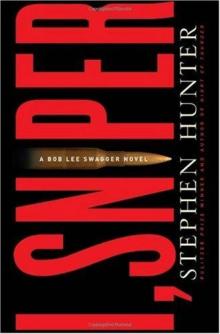 I, Sniper
I, Sniper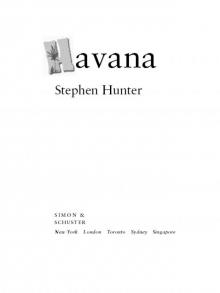 Havana
Havana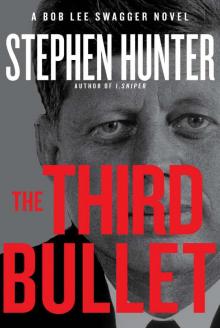 The Third Bullet
The Third Bullet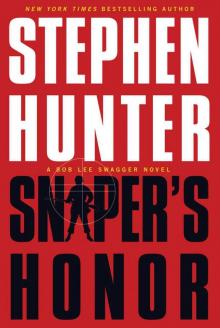 Sniper's Honor: A Bob Lee Swagger Novel
Sniper's Honor: A Bob Lee Swagger Novel Dirty White Boys
Dirty White Boys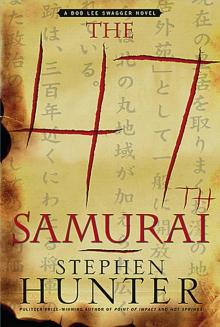 The 47th Samurai
The 47th Samurai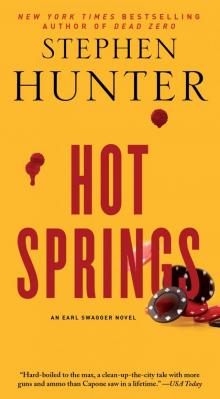 Hot Springs
Hot Springs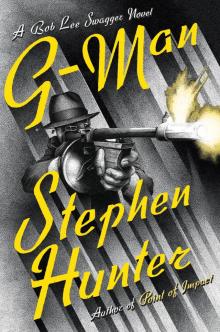 G-Man
G-Man Black Light
Black Light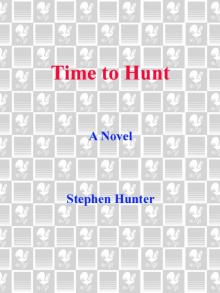 Time to Hunt
Time to Hunt The Day Before Midnight
The Day Before Midnight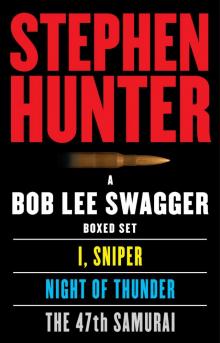 A Bob Lee Swagger Boxed Set
A Bob Lee Swagger Boxed Set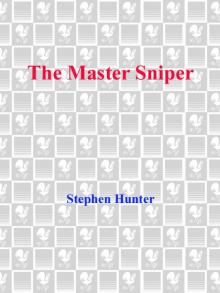 The Master Sniper
The Master Sniper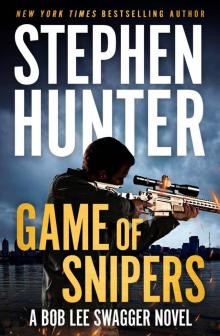 Game of Snipers
Game of Snipers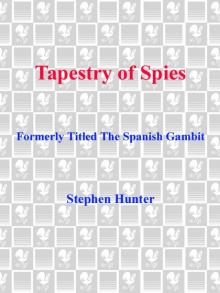 Tapestry of Spies
Tapestry of Spies Citadel
Citadel The Second Saladin
The Second Saladin Stephen Longacre's Greatest Match
Stephen Longacre's Greatest Match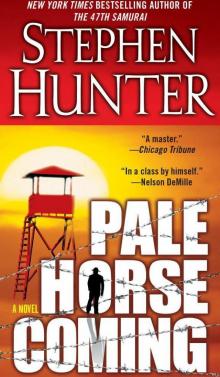 Pale Horse Coming
Pale Horse Coming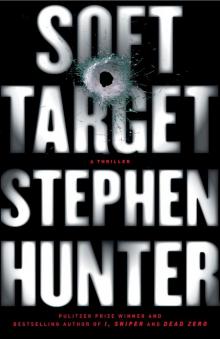 Soft Target
Soft Target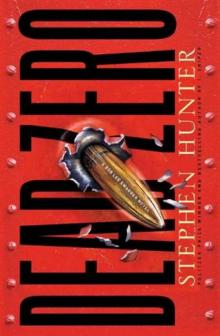 Dead Zero
Dead Zero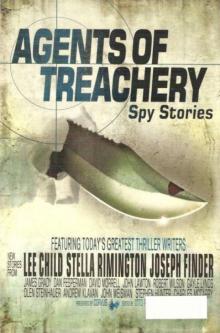 Casey at the Bat
Casey at the Bat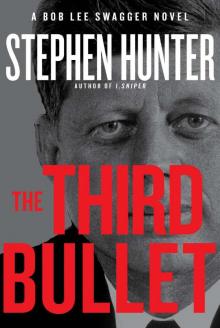 The Third Bullet bls-8
The Third Bullet bls-8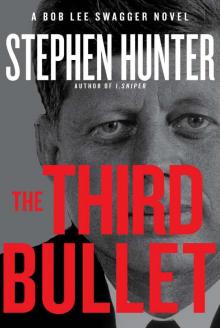 The Third Bullet: A Bob Lee Swagger Novel
The Third Bullet: A Bob Lee Swagger Novel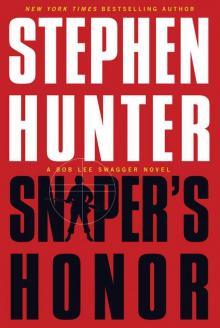 Sniper's Honor
Sniper's Honor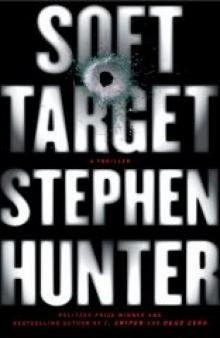 Soft target rc-1
Soft target rc-1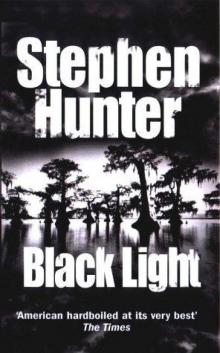 Black Light bls-2
Black Light bls-2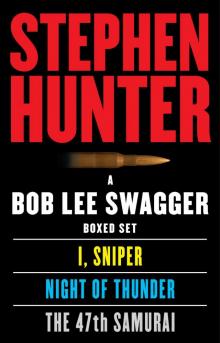 A Bob Lee Swagger eBook Boxed Set: I, Sniper, Night of Thunder, 47th Samurai
A Bob Lee Swagger eBook Boxed Set: I, Sniper, Night of Thunder, 47th Samurai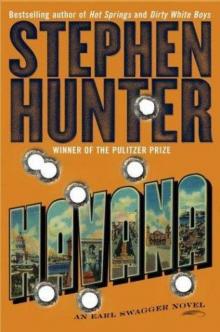 Havana es-3
Havana es-3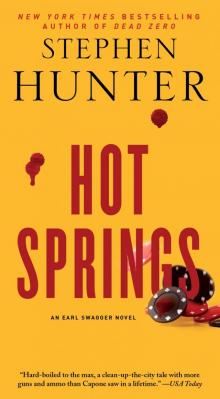 Hot Springs (Earl Swagger)
Hot Springs (Earl Swagger)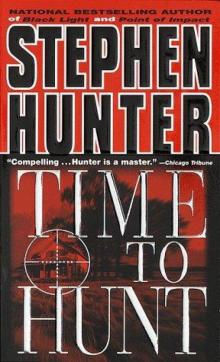 Time to Hunt bls-1
Time to Hunt bls-1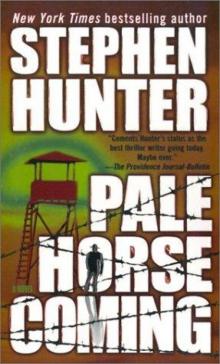 Pale Horse Coming es-2
Pale Horse Coming es-2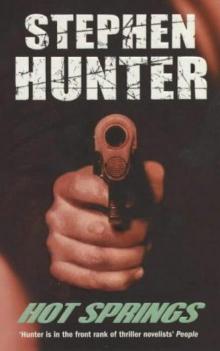 Hot Springs es-1
Hot Springs es-1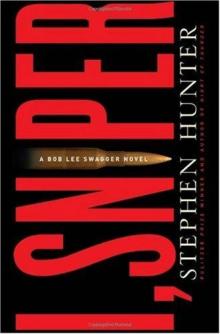 I, Sniper: A Bob Lee Swagger Novel
I, Sniper: A Bob Lee Swagger Novel